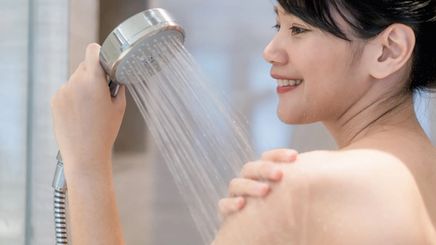
A relaxing is a great way to unwind after a long day at work or soothe tired muscles after a strenuous workout. But what if you find a good reason to skip the hot bath and try showering with lukewarm water instead? Did you know that water temperature plays a role in supporting your hair's health?
How Water Affects Your Hair
Before getting into the pros and cons of hot versus cold water, you must understand how water affects your hair's structural integrity. Your hair is naturally hydrophobic, repelling water thanks to a fatty, waxy, lipid layer on the hair's cuticle. If the hair fiber is stripped of this natural protective oil, it becomes hydrophilic, attracting and absorbing water.
Natural, untreated hair can stretch up to 30% with no damage when wet. But wet hair stretched between 30% and 70% causes irreversible changes, while hair stretched to 80% causes fractures. Repeated chemical treatments, daily grooming habits, and environmental exposure also make hair intensely porous and fragile. Damaged hair becomes hydrophilic, causing it to swell with water absorption and overly stretch when wet, which then causes fracture and .
The Benefits of Lukewarm Water
There's a reason washing hair with lukewarm water may be better for your tresses. While hot water may clean your locks better by dissolving dirt, grease, and residue, it can also strip your scalp and strands of its natural oils, . Hot water opens the cuticles of your hair, which allows more water absorption – hence the previously mentioned swelling and stretching. Eventually, this takes a toll on your hair, leaving it more prone to breakage.
On the other hand, while cold water seals the cuticles of your hair, helping it retain its natural oils, it doesn't work as well to clean your tresses of excess oils. Lukewarm water is the happy middle that allows you to effectively clean your hair without wreaking havoc.
What Does 'Lukewarm' Mean?
There are differing opinions on what a lukewarm water temperature should be. Some say it's somewhere between 36.7°C to 40.6°C (98°F to 105°F), while others believe it's 26.7°C to 32.2°C (80°F to 90°F). Collins Dictionary defines lukewarm as “slightly warm.” Or to put it another way, neither hot nor cold. To make the most of your shower, use lukewarm water for your hair cleansing and conditioning routine, then finish off with a cold-water rinse to ensure your cuticles stay sealed for hydrated hair.
How to Protect Wet, Damaged Hair
A study in the International Journal of Trichology shows you can minimize and repair with your hair care products. These products can improve hair's hydrophobic nature while strengthening the cuticle. and oils are especially great at helping prevent hair breakage by reducing friction from everyday grooming and water pick-up.
Look for conditioners that help protect the cuticle, detangle strands, and restore their natural oils. TRESemmé Pro-Color Series Color Radiance Conditioner contains Color Radiance Booster and , specially formulated to protect your hair's surface to help lock in color within hair fibers as it moisturizes to minimize frizz.
When it comes to shampoo, look for a gentle formula that restores dry and damaged locks like Dove Botanical Silicone Free Shampoo for Damaged Hair Restore. It has 100% botanical oil and Pink Moroccan Rose extract for soft, beautiful strands.
Another way to help strengthen your strands? Apply a nourishing hair oil such as . It can help reduce protein loss in damaged and undamaged hair whether you use it as a or post-wash treatment. Then use lukewarm water to cleanse and condition your mane before rinsing it off with cold water to lock in moisture and shine. Do you wash your hair in hot or cold water? Share these tips with others so they can protect their strands in the shower!